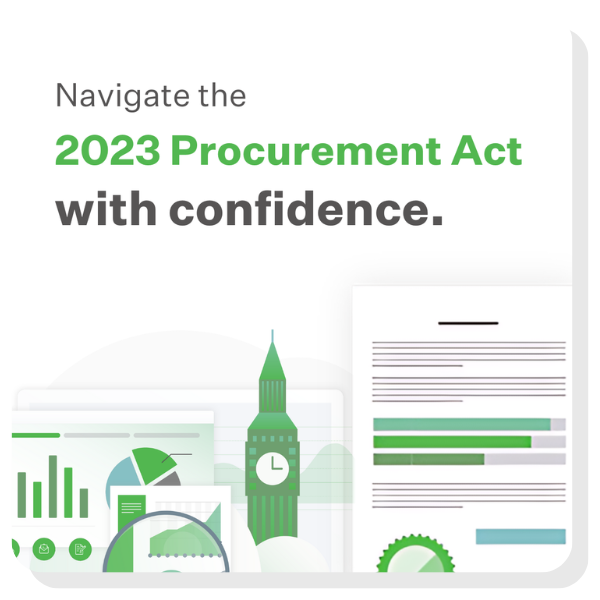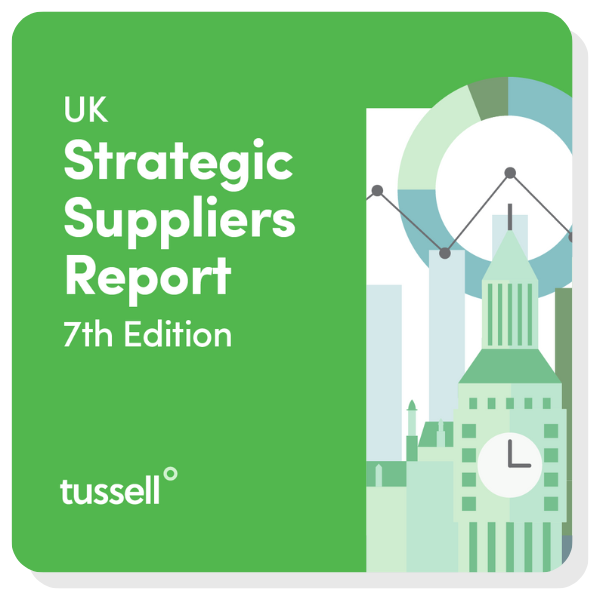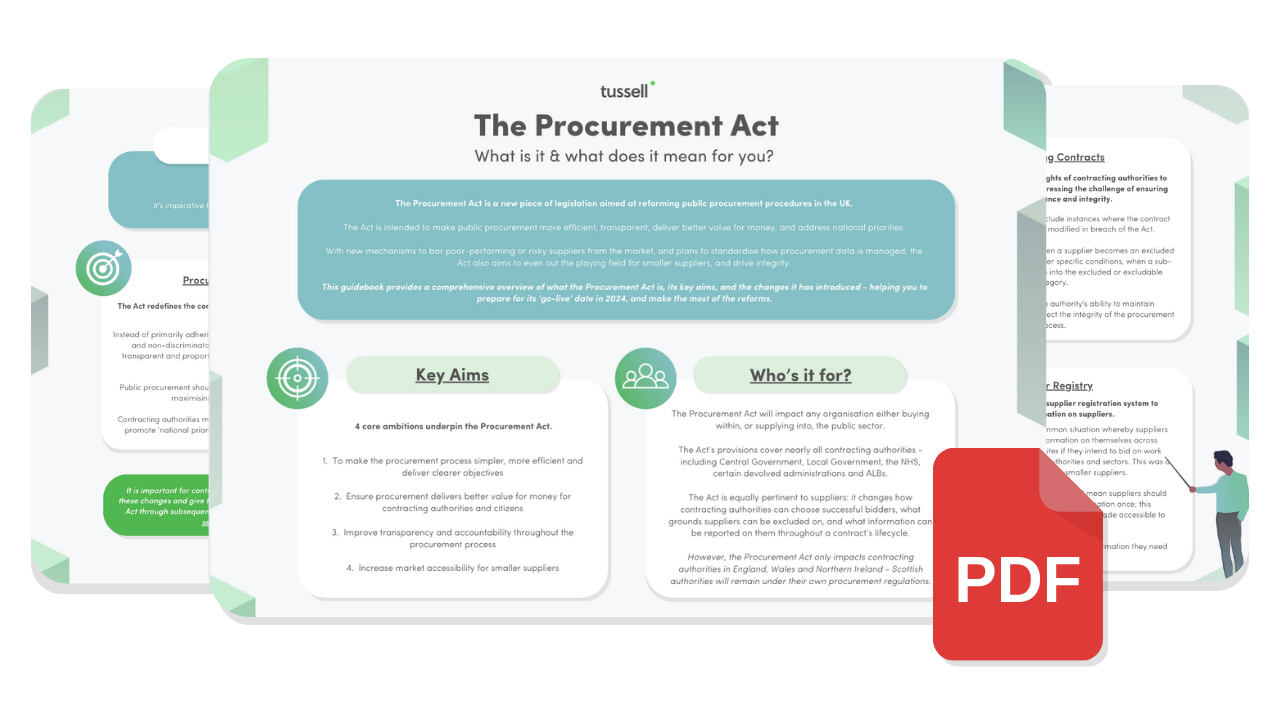The Procurement Specific Questionnaire (PSQ) is one of the many new features of public procurement brought about by the Procurement Act 2023.
This article takes a look at the PSQ - what it is, how and when it's used, and what it means for public sector buyers and suppliers.
Skip ahead to read about:
This article is part of a series of articles on the 2023 Procurement Act.
Head to Tussell's Procurement Act Hub for all the information and resources you need to get Procurement Act ready.
🔎 What is the Procurement Specific Questionnaire?
The Procurement Specific Questionnaire (PSQ) is a standardised document introduced by the Procurement Act 2023 to replace the Standard Selection Questionnaire (SQ).
Serving as a pre-qualification tool for contracting authorities, the PSQ allows suppliers to demonstrate compliance and capability when bidding for government contracts.
🤔 Why was the Procurement Specific Questionnaire introduced?
The PSQ has replaced the SQ which in turn replaced the PQQ in 2016.
When compared to previous iterations, the PSQ reduces duplication of effort by allowing answers to be reused across procurements where appropriate. This is particularly important for time-scarce SMEs and new market entrants.
The PSQ also provides clearer guidance and a simplified format, lowering administrative burden and making it easier to participate in public procurement opportunities.
For buyers, the PSQ introduces greater consistency and clarity in evaluating supplier responses. In theory, this should support fairer and more efficient assessments.
📝 What does the Procurement Specific Questionnaire contain?
The PSQ is split into three parts:
-
A confirmation of core supplier information;
-
Additional exclusions information;
-
Conditions of participation.
👉 Confirmation of core supplier information
For part 1, suppliers are expected to enter this information upon signing up to the Central Digital Platform (CDP). They don't need to resubmit this information each time a PSQ is required.
Suppliers should, however, ensure that this core information is kept up-to-date and that it is shared with relevant contracting authorities via the CDP as and when procurement opportunities arise.
👉 Additional exclusions information
For part 2, suppliers must submit their own (and their connected persons) exclusions information via the CDP. This may include whether any of the exclusion grounds apply, details of the incidents, and whether any mitigating actions have been taken.
As part of a procurement, suppliers will also need to share additional exclusions information for any suppliers that they are relying on to meet the procurement’s conditions of participation.
They will also need to include a full list of intended subcontractors. (Although, in some circumstances, this list may be provided later on in the procurement process).
👉 Conditions of participation
For part 3, contracting authorities may set specific conditions of participation which a supplier must satisfy to be awarded a public contract.
These may relate to the supplier’s legal and financial capacity or their technical ability.
Some of the information requested in the PSQ will be for informational purposes only, whereas other information may be assessed by the contracting authority.
💼 Which suppliers need to complete the Procurement Specific Questionnaire?
Completing the Procurement Specific Questionnaire (PSQ) is mandatory for all suppliers bidding on above-threshold public sector contracts, which include a selection stage.
This ensures that suppliers meet the necessary legal, financial, and technical requirements before their bids are considered.
.png?width=815&height=200&name=TUSSELL_Demo_CTA_Banners%20(3).png)
For below-threshold contracts, the PSQ is not always required, as buyers have more flexibility. However, some authorities may still choose to use it.
In all cases, submitting a PSQ signals that a supplier is organised, compliant, and ready to do business - even on smaller procurements where it is not mandated.
Suppliers awarded contracts via direct award may not need to complete the full PSQ, though they may still be asked to provide basic eligibility or compliance information, depending on the context.
For Tier 2 suppliers (subcontractors), completing the PSQ is entirely optional, as these firms are not bidding directly to the public sector. That said, being prepared to share equivalent information can strengthen relationships with Tier 1 suppliers and increase access to subcontracting opportunities.
🏛️ When should buyers consider the Procurement Specific Questionnaire?
Buyers are required to consider PSQs in any above-threshold procurement that contains a selection stage.
The selection stage is a part of the procurement process where the buyer assesses the suitability of suppliers before evaluating their tenders.
Even in open procedures, where all bids are submitted in full (and no selection stage exists), buyers still need to assess the same selection criteria -often by incorporating PSQ content directly into the tender documents.
Learn the differences between the public sector procedure types
🗺️ Is the PSQ a requirement for suppliers in the devolved regions?
The PSQ was introduced by the Procurement Act 2023, which applies to contracting authorities in England, Wales and Northern Ireland. Therefore, suppliers selling into these regions need to complete the PSQ in most cases.
In the case of Wales, details of the WPSQ (Wales Procurement Specific Questionnaire) can be found on the Welsh Government website.
The Scottish public sector is only minimally affected by the Procurement Act.
For this reason, suppliers selling into Scotland may be required to fill out the SPD (Single Procurement Document) instead.
🌅 Conclusion
Introduced by the Procurement Act 2023, the Procurement Specific Questionnaire (PSQ) is intended to increase the speed and consistency of supplier evaluation.
The change marks one of many intended to reduce the administrative burden on public sector suppliers and increase SME participation in the tendering process.
For a more in-depth look into the PSQ and how it is used, full guidance can be found on the Government Commercial Function's Procurement Pathways website.
* * *
If you're worried about how the Procurement Act will affect your business, you're not alone.
The Procurement Act presents the biggest change to public procurement in almost 10 years - possibly even longer.
And, whilst we can try to predict how the market will respond, nobody really knows.
Tussell provides data-driven insights on the public sector market so that, no matter how the procurement landscape changes, you'll always be ahead on the top frameworks, upcoming opportunities and trends in your market.
Book a demo with the Tussell team to learn how you can start using data to drive sales, future-proof your business and de-risk your public sector strategy.
This article is part of a series of articles on the 2023 Procurement Act.
Head to Tussell's Procurement Act Hub for all the information and resources you need to get Procurement Act ready.












.png?width=815&height=200&name=TUSSELL_Demo_CTA_Banners%20(6).png)

.png?width=815&height=200&name=TUSSELL_Demo_CTA_Banners%20(12).png)

-1.png?width=450&height=330&name=Procurement%20Act%20Hub%20Graphics%20(1)-1.png)


